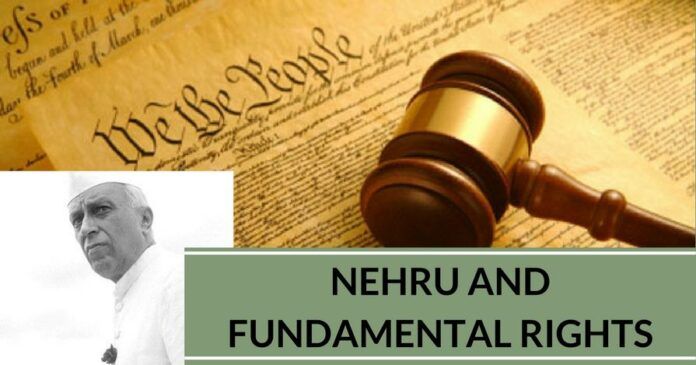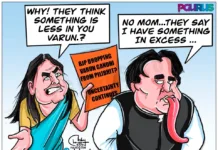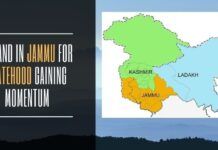
Nehru proposed an amendment to India’s constitution that would impose severe restrictions on freedom of speech
The lords of public discourse are talking about the supposed demise of dissent in India. From Shekhar Gupta and Kapil Sibal to the lesser votaries of the liberal establishment, everybody agonizes over the assaults on individual liberty and freedom of expression that, we are told, began with the ascension of Narendra Modi as Prime Minister in May 2014. The cold-blooded, premeditated murder of the Left-leaning journalist-activist Gauri Lankesh is just an episode in the sordid saga of the rise of fascism in our country—just like the lynchings by saffron Cowboys, rewriting of history, and the campaign against love jihad. We are slowly but steadily marching towards a Hindutva apocalypse—or, to be precise, a pralaya that would drown not only that is not Hindutva-compliant but also everything else that is good, glorious, and noble in Hinduism and India. Or so we are told.
But is it really so? In a way, yes, but the story even before Modi was born. I believe that the freedom of expression was much less encumbered in 1947 when our country ostensibly became free than it is today. Much of the mess was created by the regimes before the incumbent one. This is not to say that the Modi government’s record has been splendid in this regard; it made shameful remarks in the Supreme Court during the hearings on Section 66A and the privacy case, but the record is no worse than any of the earlier governments.
A variety of rules and regulations have been formulated and executed to maintain the vice-like grip around businesses
In fact, in every walk of life, the sphere of liberty has shrunk. Consider freedom in the political arena. As I wrote in an earlier article, “Parliamentarians and Members of Legislative Assembly have to obey the diktats of their respective party leaderships. Democracy stands on its head: while lawmakers are directly elected by the people and thus should be answerable to them (the people), in practice, they become answerable to, indeed servants of, party managers. And servants, like slaves and sheep, can be herded or shepherded around as per the convenience and requirements of apparatchiks” https://www.pgurus.com/you-call-this-freedom/
In another article, I had charted the course of business persons’ enslavement by government. “What has happened since Independence is that they [businesspersons] have been effectively tamed by the Indian state. Over the years, several arms of the government have been strengthened with huge, often draconian, powers to keep industrialists on a leash. Many official and quasi-official bodies, regulators, etc., have come into being to make their obnoxious presence felt at any point in time. A variety of rules and regulations have been formulated and executed to maintain the vice-like grip around businesses, getting out of which either means greasing palms or circumvention involving sharp practice. This results in a situation that makes the businessman vulnerable vis-à-vis government. There is always the threat of a raid by any of the agencies” https://www.pgurus.com/free-india-unfree-india-inc-part-2/
Similarly, the Establishment’s jihad against free speech began right after Independence. The governments in the supposedly free India should have provided the needed safeguards to uphold the cause of liberty, but they did the exact opposite. Our political masters tried to shrink rather than expand the sphere of liberty. The very First Amendment to the Constitution introduced “reasonable restrictions” on freedom of expression. The purpose was to ban or subdue anything opinion, whether, on the Left or the Right, that was unfavourable to the first prime minister Jawaharlal Nehru, the self-righteous megalomaniac who considered himself to be the repository of all wisdom and whom intellectuals regard as a great liberal.
The instant provocations for the First Amendment were: ban on Romesh Thapar’s Left-leaning magazine Crossroads by the Madras government which was set aside by courts on the grounds that it was ultra vires of the Constitutional provisions related to the right to freedom of expression; and Nehru’s displeasure with the RSS mouthpiece, Organiser.
So, the Nehru government decided to undermine the freedom of expression and other Fundamental Rights, thus initiating a process which ultimately led to the scrapping of one Fundamental Right, the right to property, in 1978 and weakening of all Fundamental Rights in general.
Nehru proposed an amendment to India’s constitution that would impose severe restrictions on freedom of speech and expression.
We are fed the narrative that Nehru was an erudite liberal who had the temperament and tenderness of a poet and prudence of a statesman. Few would doubt his erudition, but fewer would call him tolerant if all facts about the First Amendment and his other misdemeanours are made public—which are not because of the conspiracy of silence by Leftists and liberals, and the philistinism of Indian Rightists.
In its May 28, 1951, issue, the Time magazine gave a vivid description of Nehru’s intolerance: “Part of the Indian press, said [Nehru], is dirty, indulges in ‘vulgarity, indecency, and falsehood.’ To teach it manners, Nehru proposed an amendment to India’s constitution that would impose severe restrictions on freedom of speech and expression. He asked for the power to curb the press and to punish persons and newspapers for ‘contempt of court, defamation and incitement to an offence’ Nehru told Parliament: ‘It has become a matter of the deepest distress to me to see the way in which the less responsible news sheets are being conducted… not injuring me or this House much, but poisoning the minds of the younger generation.”
Nehru’s illiberality evoked a considerable response in Parliament, the fiercest from Syama Prasad Mookerjee, who was earlier Minister of Industry in the Nehru Cabinet and who went on to found the Bharatiya Jana Sangh, which would later evolve into the BJP. Mookerjee fought the First Amendment tooth and nail.
According to the Time report:
Mookerjee (to Nehru): You’ve got 240 supporters in this House, but outside in the country, millions are against you.
Nehru (shaking his fists): [Your] statements are scandalous…
Mookerjee: Your intolerance is scandalous…
Nehru (shouting): Any person who says that this amendment of mine curbs the liberty of the press utters lies…
As Nehru explained it: “We should not only give the press freedom but make it understand that freedom.”
Notice the vanity and superciliousness of Nehru: he considered himself no less than God, for freedom is an inalienable right of human beings which can be given only by God, if you are a believer, or by nature, if you are not. Thankfully, 70 years after Independence, the Supreme Court, in its judgment on privacy, has announced that life and personal freedom are inalienable rights.
Freedom is the defining feature of man, his inalienable right, not an entitlement which can be withdrawn at will.
At any rate, no government gives freedom as a gift to the people, certainly not the government run by a man as illiberal as Nehru. Freedom is the defining feature of man, his inalienable right, not an entitlement which can be withdrawn at will.
Nehru justified the First Amendment citing something as nebulous as the “interests of the general public.” He said, “During the last 15 months of the working of the Constitution, certain difficulties have been brought to light by judicial decisions and pronouncements especially in regard to the chapter on fundamental rights. The citizen’s right to freedom of speech and expression guaranteed by Article 19(1)(a) has been held by some courts to be so comprehensive as not to render a person culpable even if he advocates murder and other crimes of violence.”
This was pure hogwash as no reading of Article 19(1)(a) can show that it can be used to incite a crime. It is important to note here that Nehru just wanted “restrictions” on the freedom of expression; it was the Select Committee that insisted on the adjective “reasonable.” And yet we are told that Nehru was a great liberal and Mukherjee a ‘bigot’! Similarly, BJP leader Subramanian Swamy is said to be a maverick, a mad man, a loose cannon. This is despite the fact that he is fighting against the ‘hate speech’ laws as specified in the Sections 153, 153A,153B, 295, 295A, 298, and 505 of the Indian Penal Code.
The worst that can be said about the Modi regime is that it has not undone the sins of the earlier governments.
Such are the absurdities India’s public discourse is inundated with. There are much more absurdities. The Congress government during the Emergency said in the Supreme Court that it (the government) had to deprive the citizen of his right to life and personal liberty. Several regimes under the grand old party have imposed or tried to impose draconian laws. In 2009, Section 66A was added to the Information Technology Act by the Congress-led government. The illiberal section was invalidated by the apex court two years ago.
In a nutshell, various Congress governments have curtailed or tried to curtail liberty in India. The worst that can be said about the Modi regime is that it has not undone the sins of the earlier governments.
Note:
1. Text in Blue points to additional data on the topic.
2. The views expressed here are those of the author and do not necessarily represent or reflect the views of PGurus.
- Liberty Is Penalized, Violence Goes Untouched - December 21, 2019
- Rahul’s Howdy bloomer - September 22, 2019
- Chidambaram’s hypocrisy - August 22, 2019










